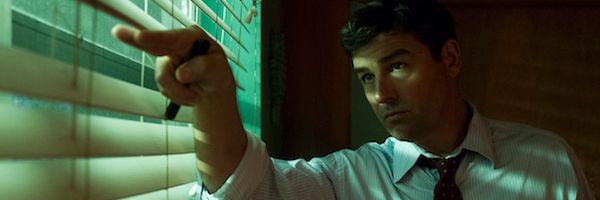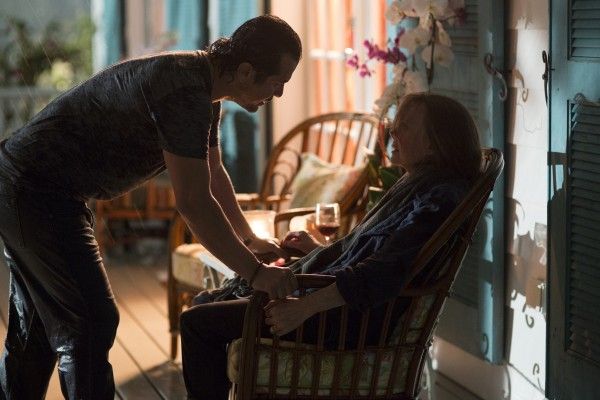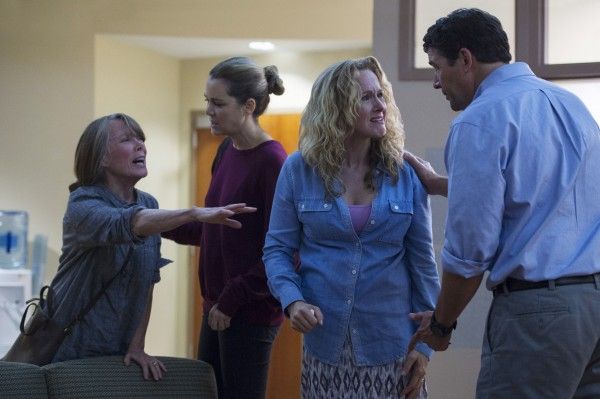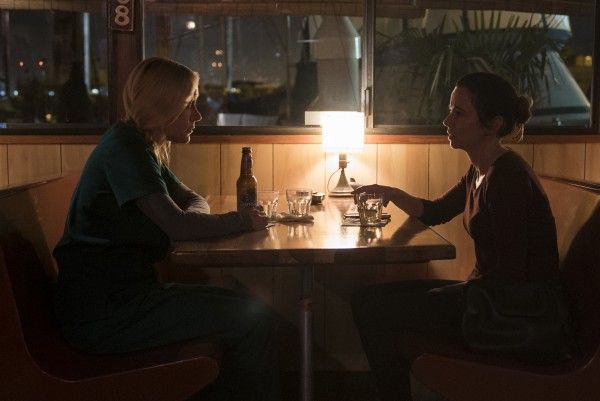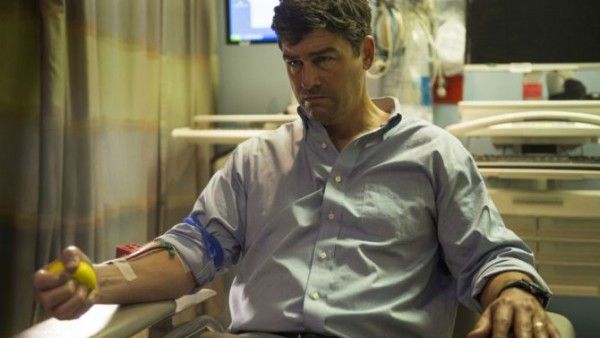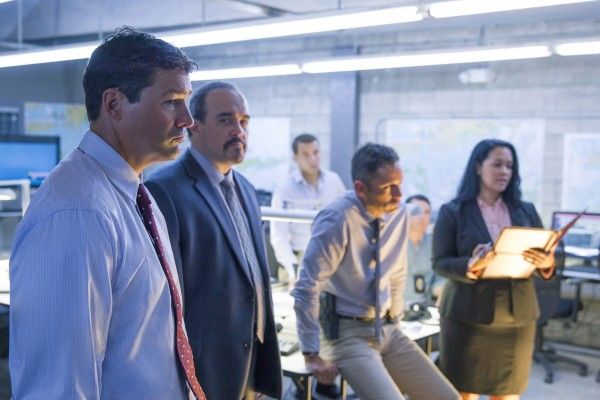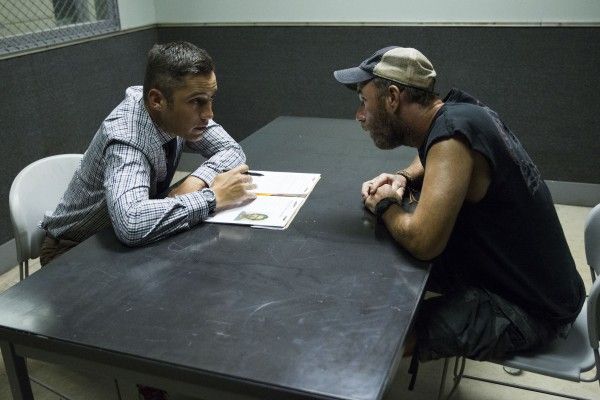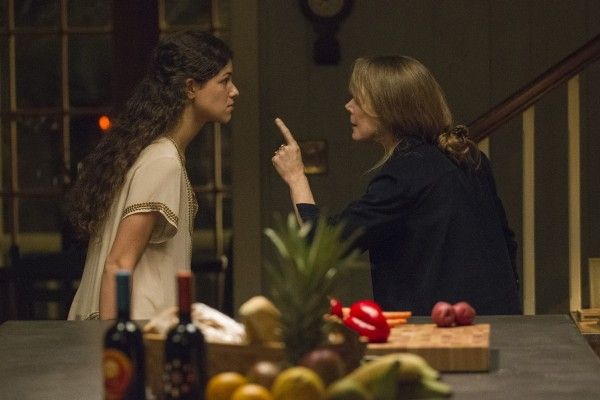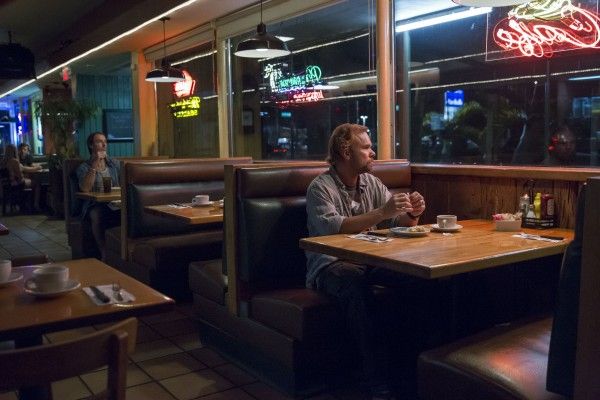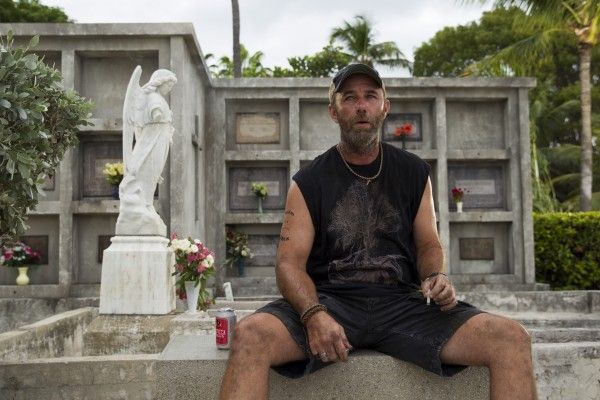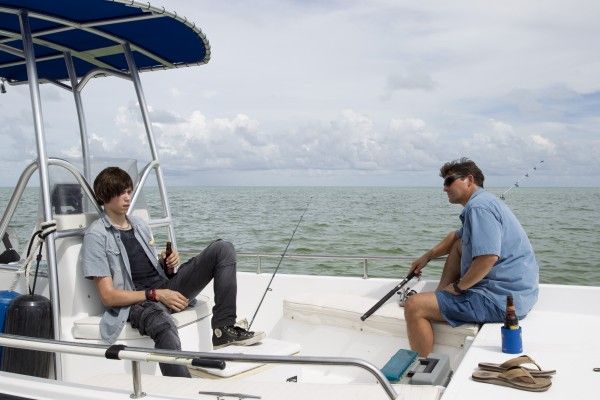After a flawlessly subtle first season and a pulpy, twisty second go-round, the Rayburns' journey is about to come to a close as Bloodline enters its third and final season. Torn apart at the start of the series by the arrival of their estranged son and brother Danny (Ben Mendelsohn), the Rayburns have spent the last 23 episodes pulling skeletons from their familial closet, as siblings Kevin (Norbert Leo Butz), John (Kyle Chandler) Meg (Linda Cardellini) and matriarch Sally (Sissy Spacek) attempt to stay afloat amongst ever-encroaching threats. As the body count continues to rise (along with the stakes), Season 3 promises to deliver the biggest thrills yet for the engrossing series.
This month, we had a chance to sit down with star Norbert Leo Butz and creator Todd A. Kessler in anticipation of the series' final season, where the pair discussed the final season's dark tone and pace, Kevin's doomed future, the third season's unique approach to storytelling, whether or not Sally will get in on the action" as the show comes to a close, and the creators' unorthodox mode of shooting.
[Please be aware that this interview contains minor spoilers for Season 1 and 2 of Bloodline.]
COLLIDER: It's the final season! I'd love to hear about when you found out you were going to be done after three, and whether or not you already had an arc ready to go.
TODD A. KESSLER: Yeah, originally the show was planned to be five or six seasons and when Netflix called us and said, ‘Hey, we’d love to do a third and final season,’ there was a moment of hold on a second, and then just quickly regrouping and saying, look, we have a lot of material, and let’s just try to make these ten episodes for the third and final season the most entertaining, deeply emotionally, satisfying story that we can. We’re super lucky to even get one season, and so the opportunity to do three and wrap it up, and also to know that third was going to be the final as opposed to, ‘Let’s do a third and we’ll see,’ and then we never get to do a fourth. To be able to know there was an end allowed us to tell a story that we feel not only excited about, but just deeply connected to and wrap up this portion of the Rayburn saga.
The pace of the show sort of sped up from Season 1 to Season 2, we got a lot more action on the second time around. Is it safe to say that speed is continuing through these next ten episodes?
KESSLER: Season 3 picks up right where Season 2 left off, and the idea was kind of exactly what you’re saying. From the launch of the series, it’s about a family. They’re not vampires, they’re not serial killers, they’re just a family. Over time, the more episodes you see, the more time you spend with the characters, you start to understand the relationships and there’s a big event in the first episode that is teased out through the season, where maybe John is saving Danny, but then by the end of the first episode it’s clear that he’s not. So the idea was that the first season would really get us to the starting line of all of these three siblings, Kevin, John, and Meg, deal with the death/murder of their brother or the killing of their brother, and then the second season launched into, ‘We’re not murderers, but how do we deal with this, how do we cope with it, what do we have to do?’
The second season led to some extreme events by the end of it, and now the third season is kind of hitting the ground running right where those events left us off and still really coping with how do we process this, how do we move forward, what can we do? And that’s really the story of the third season.
At the end of the second season, Kevin makes a decision that is probably a questionable one, to put it gently. I get the sense that the worst is yet to come for Kevin. How dark are y’all gonna go? I’m a little bit worried.
BUTZ: Look, Bloodline has never been light fare. These guys wanted to tell a deep story with a lot of dark corners and a lot of gray areas. I mean, without giving too much away, for Kevin at least, I guess for all of them, the word is really survival. I’m a father now in the show, for a guy who I imagine has always, always wanted to be a father and never had the resources or the mental health or the maturity of the confidence that he could do that now has a reason to really keep going. In the third season, yeah, we’ve dug ourselves into a huge hole, but what I sort of love about the guy is this just very flawed but tenacious will to keep his head above water, to survive.
That’s really what the season is about for me, it just becomes about doing anything and everything to be there for his kid and nothing’s going to get in the way of that. Certainly not my brother Danny who’s, from Kevin’s point of view, set all of this into motion. So I feel justified, in a perverse way, with the terrible things I do, which is not to say they don’t cause Kevin great, great suffering.
Do you find that Kevin is poised to become the next Danny, in a certain sense, or at least in terms of the arc that he’s now going to face?
BUTZ: I think that’s an interesting observation. Maybe the audience is being led down that path. I don’t think that’s the case, although they do come from the same DNA. Among many things that the show is about, generational, systemic violence and dysfunction and addiction in certain ways, and so yeah, there are parts of Danny in him. There are also parts of Danny in John, some of the great moments of the show have been when those two have squared off, the good brother and the bad brother looking into each other’s faces going, ‘I can lie, too.’ You get deeper into the family narrative, past narrative. Going back before Danny, before we were born, our parents, their parents, the violence is in the DNA.
Is it safe to say that this season will essentially answer all of our questions about what happened in the past?
KESSLER: We’re not being coy with the audience in terms of answers to things and questions that might be there. One of the things that we explored story-wise is that you have a family of -- at one point it was five siblings and now it’s three siblings -- and as events happened in the family’s history, those children, when they were children, are experiencing them differently because they’re different ages. Some of what is revealed is that John, Kevin, and Meg all have different understandings of family events because they all experience them at different ages and were able to process them differently, and unless you go back as adults and say, ‘Wait a second, I thought this happened when I was six and you were ten,’ and the ten year old has a different perspective and says, ‘No, that’s not what happened.’ It’s trying to find the truth within family events, but the reality is shaped by perspective, and at some point the truth doesn’t even matter because you’ve lived 40 years with that perspective, and if you knew the truth it’s like undoing a lot of the stitching that has created who you are in your life.
So it’s not meant to be a thing where we’re not answering, it’s more that if you’ve gotten to know these characters over the three seasons, you’ll understand. That’s what Kevin thought, that’s what Kevin experienced, that’s what John experienced. Now as adults, there are some scenes in this season where they’re actually able to challenge each other on what the truth was from their different perspectives.
Season 2 kind of used flashbacks rather than the flash forwards used in Season 1 to kind of sort through the timeline. Are you going to use a combination of both or are you doing away with them in Season 3?
KESSLER: We don’t use them that much this season. In the first season there were a lot of flash forwards to kind of help the audience understand that something is coming here, to use an Arthur Miller line, “Attention must be paid.” Yes, it’s going to start out and it’s just characters, it’s just a family, another thing put on top of this family, but we added the flash forwards to keep an audience engaged. The second season used flashbacks to flesh out the story, and in the third season we’re able to hit the ground running based on the events of the end of the second season, and really just tell a story straight through, which at times has maybe some flashes to help elucidate some moments, but it’s not the same use of them in the first two seasons.
I have always wanted to see Sally have a little more agency and a little more savvy in regards to what's going on in her family. Will Sally get in there in the mix this season?
KESSLER: That’s a great question. I think if you watch the first episode, you’ll be satisfied with Sally’s arc. Sissy did an extraordinary job each season, and it’s been very challenging for her to not be in the mix, just as a person. She understood the role of her character being excluded from what happened to Danny, and in this third season she definitely has some massive, massive character moments and scenes.
BUTZ: Sally gets her groove back. [Laughs]
I’ve heard that the process of shooting this show is kind of different, because you don’t always know everything that’s happening when you’re shooting a scene, as an actor you're not given the road map. Was that the case this time around?
BUTZ: We got scripts a little bit sooner in this third season. Because the guys knew it was going to be the final season, they were able to really finish scripts. We really didn’t know how it was going to end, but each episode, we had a full week or two with the scripts before we had to start shooting them. That was helpful, but I grew to really embrace the not knowingness of the entire process. For me it worked tremendously well, because Kevin is so bad at being a criminal and so bad at being a drug dealer and so bad at processing emotion. He’s such a reactive character, and as an actor I was able to do the same thing with the scripts. Not a lot of thinking, more reacting impulsively. He epitomizes the impulsive younger brother. I really liked that,
I never wanted to know, and in fact one director sort of let slip a reveal that was going to be happening in several episodes and I was really upset about it. You know, because we’re living there, we’re living in the Keys, we’re eating and fishing in the same waters that our characters are. You start to -- not like I’m walking around like I am Kevin, but you start to submit to kind of just being in the moment down there, and as people we don’t know what the future holds. I started to really love that as an actor. I don’t want to know. I’ll get the script and I’ll have a reaction and then I’ll just take that breath and hopefully we start shooting the next day. I liked it when I had 24 hours.
The final season of Bloodline will premiere on Netflix May 26.

